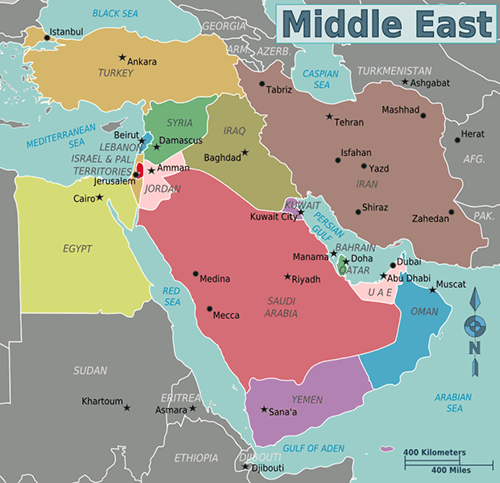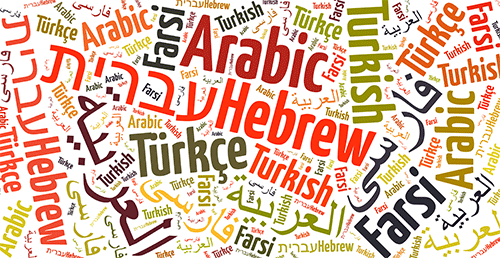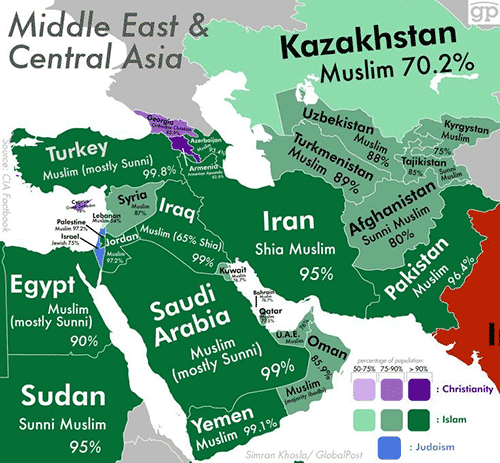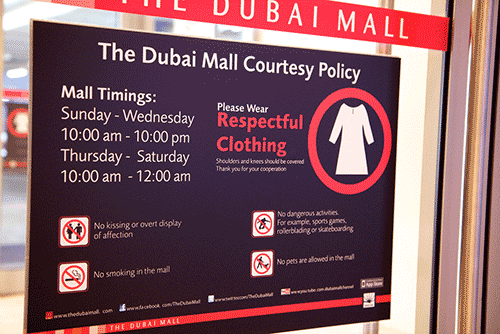With one of the highest concentrations of international schools, the Middle East is one of the most popular destinations for expat teachers. The culturally diverse area that’s one of the “cradles of civilization” is a wonderful place to work, but there are some questions you should ask before you board the your next Emirates flight. This article deals with some important issues to consider, from the facetious (how hard is it to get a beer) to the more serious questions (how much do I know about religion).
1. Where exactly do I want to go?

Source: Easyscienceforkids.com
Remember that the Middle East is a region centered on Western Asia and Egypt, and doesn’t refer to a particular country. The countries that make up the region are much more diverse in terms of culture, religion, and even language than you might expect. The Gulf States (Bahrain, Iraq, Kuwait, Oman, Qatar, Saudi Arabia and the UAE) are very different from those in the Levant (Cyprus, Israel, Jordan, Lebanon, Palestine, Syria, Turkey), and Israel and Iran couldn’t be more unalike. Factors to consider when deciding would be your expected salary, political situation in the country, and the amount of personal freedom.
2. What language do I want to learn/speak?

Source: KU.edu
Even for those who have a good grasp of Modern Standard Arabic, the dialects in each country vary tremendously. While most places don’t require you to speak the local language, having some language ability will go a long away to making your interactions with locals and your overall living abroad experience much more enjoyable. In addition to Arabic, other languages that are widespread are Hebrew (Israel) and Farsi (Iran).
3. How much do I know about religion?

Source: Pinterest.com
As you may have already known, religion is a big part of society and culture in almost all of the Middle Eastern countries. However, one of the biggest causes of confusion in the West about the Middle East is that some people use the words Muslim and Arab interchangeably. In fact, Arabs are part of an ethnic group, not a religion, and not all Arabs are Muslim. In addition, not all Middle Easterners are Arabs. People in Iran, for example, are also known as Persians, and they are definitely not Arabs. Turkish people are also often incorrectly called Arabs. Within the religion of Islam Sunni Muslims make up most of the Muslim world (roughly 90%). is a notable exception where Shi’a Muslims outnumber Sunnis 15 to 1. Finally, you’ll get used much more quickly than you think to the hum of the call to prayer at sunrise.
4. How important are beer and bacon to me?

Source: Atinka
Attitudes towards alcohol consumption will vary based on how conservative the local culture is and it’s unlikely you’ll be able to enjoy the typical expat party lifestyle. In Iran, Kuwait, Saudia Arabia and Yemen, alcohol consumption is completely prohibited. While some expats brew alcohol in their bathtubs, and alcohol is available at (expensive) embassy parties and in some cases at high-class hotels, if you’re the type of person who enjoys a cold on after a hard day of work, these countries are probably not for you. Other countries, like the UAE, do prohibit alcohol consumption for Muslims, but non-Muslims are allowed to enjoy an alcoholic beverage or two. In Qatar, any liquor is confiscated upon arrival and returned upon departure. That being said, Doha’s hotels are full of bars where Westerners are paying exorbitant prices for drinks. Alcohol is pretty readily available in Egypt, Lebanon, Syria, Jordan, Morocco and Tunisia, but expect to pay much higher prices than you would at home. Finally, keep in mind that the sale of pork is prohibited throughout of the Muslim world, so if you enjoy some bacon with your scrambled eggs, think again. In Lebanon, Turkey, Bahrain, Syria and parts of the UAE pork is still available in international hotels and some supermarkets that cater to expatriates and non-Muslims. Even if you choose to work in a more restrictive country, there’s likely to be a black market for both beer and, yes, bacon.
5. What can I wear?

Source: Expatwoman.com
When traveling to the Middle East there are a lot of traditions and customs that men and especially women need to take into consideration. Men should dress in long pants and a shirt that covers your shoulders. A T-shirt works, but a button down shirt is more respectful. Men can wear shorts, but make sure they are knee length. Women should be wearing long pants or skirts and long sleeve shirts covering the chest are and the neck. The loose, light clothing that’s worn by the locals is actually very comfortable and often feels better than wearing shorts or a skirt. You might think it’s okay to wear clothes that show a little bit more skin in less conservative places like Beirut or Dubai, but you’ll still feel uncomfortable and will likely attract unwanted attention. And while it’s certainly possible to wear shorts or skirts in slightly more conservative places like Cairo, the unwanted attention and even physical contact will probably change your mind. A headscarf is optional for foreign visitors, but I often wear a scarf to blend in and respect the culture around me, and to avoid unwanted attention.
6. How much do I want to earn?

The Middle East is famous for its high salaries, but not every country in the region offers the same compensation. In Saudi Arabia, earning 50,000 USD per year as a beginning teacher isn’t uncommon. In addition, schools will provide for your accommodation, flights and medical insurance, which means that your day-to-day costs are minimal and your ability to save is maximized. However, you might have to settle for half of that if you intend to teach in Tel Aviv, Israel. Typically, there will be a trade-off between the amount of personal freedom you’ll enjoy and the salary you’ll earn.
Banner: Intrepidtravel.com
By Marie, Marketing @ Teaching Nomad.
About our company: Teaching Nomad is an American owned and operated education recruitment company based in Shanghai, China. Our goal and purpose is to help great teachers find great teaching jobs. Year round, we have hundreds of teaching job vacancies. Whether your goal is to be an ESL teacher or teach in an international school, we have a teaching job for you. You can browse jobs online at www.teachingnomad.com/job-search for the latest job openings. Teaching Nomad is here to make teaching in China easier, so please feel free to reach out and contact us with any questions or inquiries!

